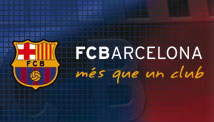From the 75th Anniversary to the European Cup (1974-1992)

News article on: History
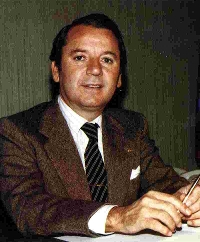
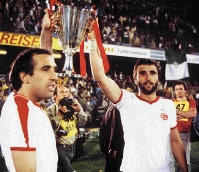
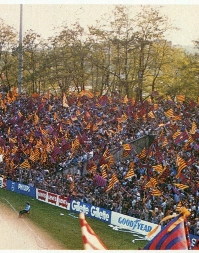
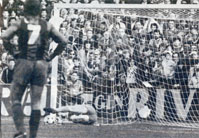
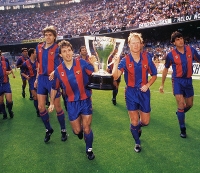
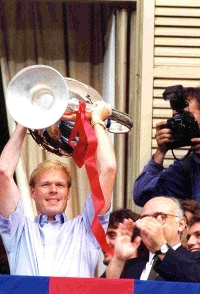
From the 75th Anniversary to the European Cup (1974-1992)
The 75th anniversary had clearly demonstrated the full potential of the club and its influence on Catalan society, at a time when civilian life was highly affected by the political conditions being imposed by the Franco dictatorship.
The arrival of democracy not only meant major changes in the country on a political level, but also
in all other aspects of society, sport included. Clubs now had to be run democratically, as did
federations, all under the auspices of democratic governments, both in terms of Spain as a whole,
and in terms of the autonomous region of Catalonia.
At Barça, it was president Agustí Montal who led the club through the transition to democracy
until the first elections, in which the members voted Josep Lluís Núñez in as president, somebody
who would go on to enjoy the longest presidency in the history of the club. Football was seeing
major changes. The contracting of foreign players was consolidated, and on a financial level, the
sport was booming, in part due to what was known at the time as “atypical income”,
which included television rights, especially when contracts with the main private broadcasters came
into play. But the club was heading in the opposite direction. It would be ten years before Barça
won another league title, but that would soon be followed with the most coveted title of all, the
European Cup, along with the four consecutive League championships won by the 'Dream Team'.
The 1978 elections
After several years without being able to hold free elections, in May 1978, the members were
able to choose their own president. It was a close result between three candidates: Josep Lluís
Núñez received 10,352 votes; Ferran Ariño, 9,537; and Nicolau Casaus, 6,202. Núñez would stay in
office until the year 2000.
Barça masses flock to Basle
1979 was an important year for Barça, as they won the Cup Winners Cup for the time ever, in
Basle. But it was not just the win that impressed, but also the amazing presence of almost 30,000
fans at the final in the biggest display to date of the colours of Barcelona and Catalonia in
Europe. There were unprecedented celebrations in the streets of Barcelona and other Catalan cities.
Barça would win the Cup Winners Cup again in both 1982 and 1989.
The club keeps growing
The club never stopped growing through all that time. There were 66,000 members in 1974,
which had become 77,000 by 1978, and as many as 98,000 in 1992, although at one point in 1986 the
figure had been as high as 108,000. There were also more and more supporters clubs. There were 96
in 1979, while there were almost 700 by 1993. The Camp Nou was also expanded on occasion of the
World Cup in 1982, the same year that the Miniestadi was built.
Urruti, I love you
But there were to be no further League titles until the 1984-1985 season, when Barça ran away
with it, securing the championship in Valladolid with four games still to play. That game was
decided when goalkeeper Urruti saved a penalty in the last minute to mathematically clinch the
title. The emotion of the moment was perfectly captured by commentator Joaquim M. Puyal’s
famous cry of “Urruti, I love you”, which has gone down in club folklore. The squad
that year included such greats as Julio Alberto, Migueli, Archibald, Schuster, and captain
Alexanco.
The 'Dream Team' years (1990-1994)
Disappointment followed the 1985 league winning season, when Barça lost the 1986 European Cup
Final in Seville. Further problems followed shortly after, culminating in the infamous Hesperia
Mutiny, in which the players demanded the resignation of the board. The directors needed to find a
way of changing the way the club was heading, and that change came in the form of Johan Cruyff, who
had a whole new philosophy of the way football should be played and immediately set about
rebuilding the squad. What he created was a team with a new winning mentality, and which would come
to be known as the 'Dream Team'. That legendary side enjoyed success after success, including four
consecutive league titles from 1991 to 1994, and the club’s first ever European Cup.
May 20, 1992: an unforgettable day
The first European Cup, won on the night of May 20, 1992 at the legendary Wembley Stadium in
London, deserves a special mention. The opposition was Sampdoria of Genoa, and Barça won 1-0 with
Ronald Koeman’s brilliant free kick in extra time. The team that won the club’s first
ever European Cup title was: Zubizarreta, Nando, Ferrer, Koeman, Juan Carlos, Bakero, Salines
(Goikoetxea), Stoitchkov, Laudrup, Guardiola (Alexanko) and Eusebio.
FC Barcelona History
More than a Club
Corporate information
Official sponsors
Copyright - FCBarcelona | Legal Terms | Buy tickets FC Barcelona | This is the FC Barcelona official website

